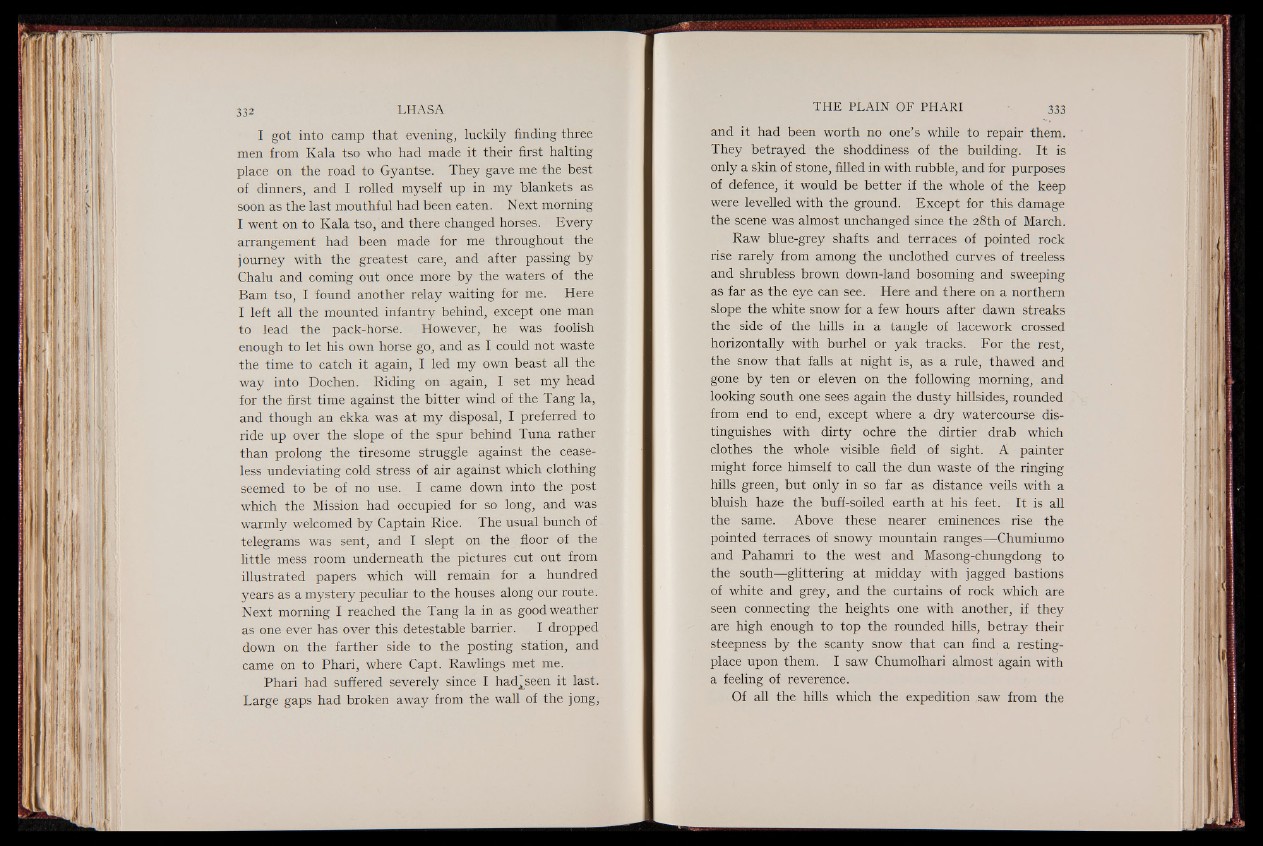
I got into camp that evening, luckily finding three
men from Kala tso who had made it their first halting
place on the road to Gyantse. They gave me the best
of dinners, and I rolled myself up in my blankets as
soon as the last mouthful had been eaten. Next morning
I went on to Kala tso, and there changed horses. Every
arrangement had been made for me throughout the
journey with the greatest care, and after passing by
Chalu and coming out once more by the waters of the
Bam tso, I found another relay waiting for me. Here
I left all the mounted infantry behind, except one man
to lead the pack-horse. However, he was foolish
enough to let his own horse go, and as I could not waste
the time to catch it again, I led my own beast all the
way into Dochen. Riding on again, I set my head
for the first time against the bitter wind of the Tang la,
and though an ekka was at my disposal, I preferred to
ride up over the slope of the spur behind Tuna rather
th an prolong the tiresome struggle against the ceaseless
undeviating cold stress of air against which clothing
seemed to be of no use. I came down into the post
which the Mission had occupied for so long, and was
warmly welcomed by Captain Rice. The usual bunch of
telegrams was sent, and I slept on the floor of the
little mess room underneath the pictures cut out from
illustrated papers which will remain for a hundred
years as a mystery peculiar to the houses along our route.
Next morning I reached the Tang la in as good weather
as one ever has over this detestable barrier. I dropped
down on the farther side to the posting station, and
came on to Phari, where Capt. Rawlings met me.
Phari had suffered severely since I had^seen it last.
Large gaps had broken away from the wall of the jong,
and it had been worth no one’s while to repair them.
They betrayed the shoddiness of the building. It is
only a skin of stone, filled in with rubble, and for purposes
of defence, it would be better if the whole of the keep
were levelled with the ground. Except for this damage
the scene was almost unchanged since the 28th of March.
Raw blue-grey shafts and terraces of pointed rock
rise rarely from among the unclothed curves of treeless
and shrubless brown down-land bosoming and sweeping
as far as the eye can see. Here and there on a northern
slope the white snow for a few hours after dawn streaks
the side of the hills in a tangle of lacework crossed
horizontally with burhel or yak tracks. For the rest,
the snow that falls at night is, as a rule, thawed and
gone by ten or eleven on the following morning, and
looking south one sees again the dusty hillsides, rounded
from end to end, except where a dry watercourse distinguishes
with dirty ochre the dirtier drab which
clothes the whole visible field of sight. A painter
might force himself to call the dun waste of the ringing
hills green, but only in so far as distance veils with a
bluish haze the buff-soiled earth at his feet. It is all
the same. Above these nearer eminences rise the
pointed terraces of snowy mountain ranges— Chumiumo
and Pahamri to the west and Masong-chungdong to
the south— glittering at midday with jagged bastions
of white and grey, and the curtains of rock which are
seen connecting the heights one with another, if they
are high enough to top the rounded hills, betray their
steepness by the scanty snow that can find a resting-
place upon them. I saw Chumolhari almost again with
a feeling of reverence.
Of all the hills which the expedition ,saw from the